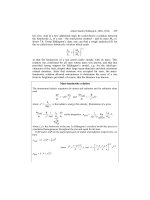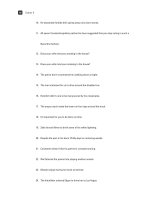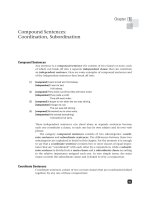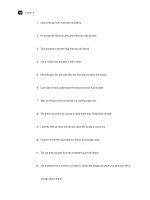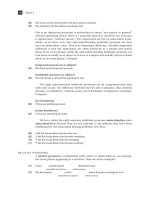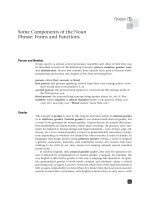Analyzing the Grammar of English Third Edition phần 5 ppsx
Bạn đang xem bản rút gọn của tài liệu. Xem và tải ngay bản đầy đủ của tài liệu tại đây (252.79 KB, 26 trang )
Chapter 4
86
Weak obligation
[42] I should go now.
[43] I ought to go now.
Medium obligation
[44] I’m supposed to go now.
[45] I had better go now.
Strong obligation
[46] I must go now.
[47] I have (got) to go now.
All modals of obligation express a sense of duty that ranges from the mildly sua-
sive to the patently powerful. Note the growing sense of duty that the following
sequence exemplifies:
[48] I should /ought to mow the lawn (but I will probably put it off until later). [Another way to express
this very mild and easily overlooked sense of obligation is Oh I know I really should mow the
lawn, but ]
[49] I had better /am supposed to mow the lawn (and I am sure I will get around to it real soon).
[50] I must /have (got) to mow the lawn, so here I go!
Activity 4.1
THINKING IT THROUGH
A. Underline the modal verb and then describe the modality type—physical/mental ability,
making requests/granting permission, etc.—of each of the modals in the following sentences.
Prove your point by employing the appropriate substitution test when possible.
Example of how to proceed:
X. She said she might drop by to say hello tomorrow.
In this sentence, might expresses possibility. A substitution test would be She said it is
possible for her to drop by to say hello tomorrow.
1. From the way he dresses he could be anything—cop, groom, mafia chief, janitor, thug . . .
2. It may rain on our parade.
3. May I come in?
4. May all your children be psychiatrists.
5. If you combed your hair a different way you might have better luck.
6. You should be able to make it as far as Phoenix tonight.
079-112.Teschner.04.indd 86079-112.Teschner.04.indd 86 4/2/07 6:11:11 PM4/2/07 6:11:11 PM
87
7. I think I may get an A on the next test.
8. Could you please lend me $5,000,000?
9. You must work eighty hours a week if you want a promotion.
10. I can play baseball better than you can.
11. I have no idea who could have killed my uncle Thigbert.
12. Should I buy the white one or the green one?
13. You shouldn’t buy anything until you can afford it.
14. Who’s at the door? It must be my mother-in-law.
15. Would you please shut up?
WRITING IT OUT
B. Make up a sentence for each of these modals in the indicated modality type.
Example of how to proceed:
X. might (expressing possibility)
If I scrub real hard, I might finally be able to get rid of these body lice.
1. may (requesting or granting permission)
2. must (inevitability)
3. should (supposition)
4. should (solicitation of opinions)
5. can (physical or mental ability)
6. could (possibility)
7. must (probability)
8. would (making requests)
Modals and Perimodals
079-112.Teschner.04.indd 87079-112.Teschner.04.indd 87 4/2/07 6:11:12 PM4/2/07 6:11:12 PM
Chapter 4
88
C. Make up a sentence for each of the following perimodals. Then explain each one’s mean-
ing by paraphrasing it.
Example of how to proceed:
X. have got to: “Wendy says we’ve just got to get together!” This semi-auxiliary expresses
a sense of obligation that can be paraphrased thus: “We just must get together!”
1. had better
2. would just as soon
3. might as well
4. be going to
5. ought to
6. be about to
7. would be able to
8. would rather
9. would sooner
10. be likely to
D. Use such notions as urgency and conviction to explain how the following five sentences
(which obviously form part of a sequence) differ from each other in meaning.
1. She could stop drinking.
2. She should stop drinking.
3. She had better stop drinking.
4. She must stop drinking.
5. She absolutely positively will stop drinking.
079-112.Teschner.04.indd 88079-112.Teschner.04.indd 88 4/2/07 6:11:13 PM4/2/07 6:11:13 PM
89
E. Using the terminology you have learned in this section of the textbook, explain what is
wrong with each of the following ungrammatical sentences.
Example of how to proceed:
X. *It oughts to rain real soon. “The marginal modal ought to does not inflect for person
and number so the s must be deleted, like this: ‘It ought to rain real soon.’”
1. *He knows he musts stop drinking.
2. *I’ve come to understand that I should to get as much exercise as possible.
3. *They don’t will come to the party unless I urge them.
4. *If it’s Saturday night, you’re mighting be watch TV at home.
5. *Why did you insist that he oughted to come right home?
Two-Word Verbs: Prepositional Verbs vs. Particle Verbs
English, like all the other Germanic languages (German, Swiss German, Low
German, Letzebürgsch, Dutch, Frisian, Danish, Swedish, Norwegian, Icelandic,
Yiddish, and Faroese), is very fond of what we call two-word verbs in which the
first element is a “real” verb form and the second is a short little function word.
Here are two examples:
[51] They called on their teacher.
[52] They called up their teacher.
Called is the “real” or LV form, and on and up are the function words. Words like
on and up are normally both prepositions; we know this because they can appear
in the following slot, where we find the usual prepositional indicators of posi-
tion, time, space, duration, etc. (see chapter 1):
up
around
on top of
by
[53] Yvonne ran below the hill.
in front of
beneath
near
⎧
⎪
⎪
⎪
⎨
⎪
⎪
⎪
⎩
beside
⎫
⎪
⎪
⎪
⎬
⎪
⎪
⎪
⎭
However, when participating in a two-word verb construction, only the word
on is a preposition while the word up is something different, something we call
a particle. We know this is so by comparing the way that on and up behave
Two-Word Verbs: Prepositional Verbs vs. Particle Verbs
079-112.Teschner.04.indd 89079-112.Teschner.04.indd 89 4/2/07 6:11:14 PM4/2/07 6:11:14 PM
Chapter 4
90
in the following sentences, where call on means ‘to visit’ and call up means ‘to
telephone’:
1. a. They called on their teacher.
*They called their teacher on.
b. They called up their teacher.
They called their teacher up.
2. a. They called on him.
*They called him on.
b. *They called up him.
They called him up.
3. a. They called frequently on their teacher.
b. *They called frequently up their teacher.
4. a. The woman on whom they called was their teacher.
b. *The woman up whom they called was their teacher.
5. a. On which teacher did they call?
b. *Up which teacher did they call?
Obviously, call on and call up behave differently, so we are forced to conclude
that each belongs to a separate category of two-word verbs. Let’s look first at call
on. The function word on in call on appears syntactically where we would expect
a preposition to appear, namely, before the noun or pronoun that it governs.
(Remember that a preposition likes the “pre”-position, i.e., the position before a
noun or a pronoun.) We therefore label the two-word verb call on a prepositional
verb. But the function word up in call up does not necessarily appear before
nouns or pronouns, so we give it another name: particle. Thus two-word verbs
that behave like call up are termed particle verbs (which some linguists also call
phrasal verbs).
The following material further explains prepositional and particle verbs’ dif-
ferences. (It is a good idea to review what you learned in chapter 1 about nouns,
[relative] pronouns, objects, and adverbs before reading on.)
Prepositional Verbs (prep-V) Particle Verbs (parc-V)
To simplify, a prep-v’s preposition
can or must go before things, not
after things.
To simplify, a parc-v’s particle must
go after things, not before (with just
one important exception, 1’s noun
objects; see below).
1. with a noun object:
The preposition must go before
the noun object:
They called on their teacher.
*They called their teacher on.
1. with a noun object:
The particle can go either after or
before the noun object:
They called up their teacher.
They called their teacher up.
(Since particles are supposed
to “go after things”—in this
case after the noun object—it is
accurate to say that the particle
going before the noun object in
“They called up their teacher”
has been moved to that position.
Moving it there is called particle
movement.)
079-112.Teschner.04.indd 90079-112.Teschner.04.indd 90 4/2/07 6:11:15 PM4/2/07 6:11:15 PM
91
2. with a pronoun object:
The preposition must go before
the pronoun object:
They called on him.
*They called him on.
2. with a pronoun object:
The particle must go after the
pronoun object:
*They called up him.
They called him up.
Prepositional verbs appear in the following three syntactic environments—intru-
sive adverbs, intrusive relative pronouns, and fronted wh-words—but particle
verbs do not. (Here is another way to say this: prepositional verbs accept adverb
intrusion, relative pronoun intrusion, and wh-word fronting, whereas particle
verbs do not accept them.)
3. adverb intrusion:
Adverbs can intrude between the
LV and the preposition:
3. adverb intrusion:
Adverbs cannot intrude between
the LV and the particle:
They called frequently on their
teacher.
*They called frequently up their
teacher.
Note that in sentences containing prepositional or particle verbs, adverbs can
also appear in several other positions, as the following samples will show: prep-
ositional—Frequently they called on their teacher/They frequently called on their
teacher/They called on their teacher frequently; particle—Frequently they called up their
teacher/They frequently called up their teacher/They called up their teacher frequently.
4. relative pronoun intrusion
In keeping with the rule that
prepositions go before, a prep-v’s
preposition can precede an intru-
sive relative pronoun:
The woman on whom they
called was their teacher.
The woman whom they called
on was their teacher.
4. relative pronoun intrusion
Particles, however, cannot precede
an intrusive relative pronoun. As
usual, particles must go after their
LVs:
*The woman up whom they
called was their teacher.
The woman whom they called
up was their teacher.
If no relative pronoun intrudes, prep-v and parc-v constructions superficially
resemble each other:
[54] The woman they called on was their teacher.
[55] The woman they called up was their teacher.
Sentences (54) and (55) involve the phenomenon known as gapping, in which a
deletable element is omitted from the surface structure. (See chapter 6 for a lengthy
discussion of gapping.) Even when the deletable element—in this case the relative
pronoun—is reinstated, the two constructions share a superficial resemblance:
[56] The woman who(m) they called on was their teacher.
[57] The woman who(m) they called up was their teacher.
Only when the “little” word is fronted—moved frontward in the sentence—do
the structural differences between prep-v’s and parc-v’s become clear, as we have
Two-Word Verbs: Prepositional Verbs vs. Particle Verbs
079-112.Teschner.04.indd 91079-112.Teschner.04.indd 91 4/2/07 6:11:15 PM4/2/07 6:11:15 PM
Chapter 4
92
seen in The woman on whom they called was their teacher vs. *The woman up whom
they called was their teacher.
5. wh-word as fronted noun object
When a noun-object wh-word
is fronted and thus appears in
sentence-initial position, it can be
preceded by a preposition:
On which woman did they call?
5. wh-word as fronted noun object
When a noun-object wh-word is
fronted and thus appears in sen-
tence-initial position, it cannot be
preceded by a particle:
*Up which woman did they call?
Note that prepositions as well as particles can appear in clause-final position in
constructions involving wh-words as fronted noun objects:
[58] Which woman did they call on?
[59] Which woman did they call up?
GENERAL COMMENTS ABOUT PREPOSITIONAL VS. PARTICLE VERBS
At least 75 percent of all two-word verbs are prepositional verbs. Therefore, par-
ticle verbs are the marked category—the nondefault one—and prepositional
verbs are the unmarked (majoritarian default) category. So the rule of thumb
is: when in doubt, assume that a two-word verb is a prepositional verb unless
proven otherwise. And the best way for you to “prove otherwise” is to apply any
one of the five environments we have just finished examining. In particular,
try applying the first or “noun object” environment because it is always easy to
come up with a noun object to complement a transitive verb. (See the next sec-
tion in this chapter for a discussion of transitivity.)
Activity 4.2
THINKING IT THROUGH
A. Tell whether the underlined two-word verbs are prepositional verbs or particle verbs.
Support your decision by offering proof, that is, by telling which of the five construction types
the particular verb appears in.
Example of how to proceed:
X. The angry mob chased the gangster out. “Chase out is a particle verb because the ‘little’
word, out, can appear after its noun object and could also appear before it (The angry
mob chased out the gangster) as discussed in construction type number one.”
1. We set up the VCR.
2. That calls for a lot of planning.
3. I’m going to fill out the forms.
079-112.Teschner.04.indd 92079-112.Teschner.04.indd 92 4/2/07 6:11:17 PM4/2/07 6:11:17 PM
93
4. Let’s tear down that shack.
5. I found him out.
6. Go for it!
7. They looked up my name in the directory.
8. She immediately called out the army.
9. I want you to look at my wart.
10. We don’t approve of what you are doing.
11. The city engineer turned on the switch.
12. That actor really turns me on.
13. Without any warning he turned on me and ended our friendship.
14. He’s always invested heavily in California real estate.
15. In what do you expect me to believe?
16. To whom did he turn in his hour of need?
Two-Word Verbs: Prepositional Verbs vs. Particle Verbs
079-112.Teschner.04.indd 93079-112.Teschner.04.indd 93 4/2/07 6:11:18 PM4/2/07 6:11:18 PM
Chapter 4
94
B. Write out the correct version of each of these sentences. Then explain, using grammatical
terminology, what is wrong with each one and why.
Example of how to proceed:
X. *Up which sale did she ring just now? “The correct version is ‘Which sale did she
ring up just now?’ The explanation for why the asterisked sentence is wrong can be
found in section five, which discusses wh-words as fronted noun objects. Because the
wh-word plus noun-object which sale has been fronted, up—as a particle—cannot
precede it. (And this failure to be able to precede is proof that up is a particle and not a
preposition.)”
1. *Give back it right now!
2. *They took rapidly over the company.
3. *He laughed us at.
4. *The gangster off whom they bumped was my godfather.
5. *They took out it at seven o’clock.
WRITING IT OUT
C. Make up a sentence with each of these two-word verbs. Make sure each sentence con-
tains a direct object similar to sentences 1–16 above, for example: He called on his teacher
[direct object].
1. hand over
2. put out
3. break up
4. see through
079-112.Teschner.04.indd 94079-112.Teschner.04.indd 94 4/2/07 6:11:18 PM4/2/07 6:11:18 PM
95
5. hold back
6. bring in
7. stay off
8. look out
9. put off
10. whip up
Transitivity: Active Voice, Passive Voice
Most verbs in English are transitive, which means that they take or are able to
take a direct object. As we know from chapter 1, a direct object—noun or pro-
noun—is the first recipient of the action of a verb. Let’s relate these terms to an
actual sentence containing two different object nouns:
[60] Rebecca gave Elizabeth the money.
subject verb object object
In (60), money is the first recipient (and thus the direct object [DO]) because in
order for Rebecca to give the money to Elizabeth, Rebecca must first pick the
money up, take it from her purse, earn it, borrow it, etc. Only when she has it in
her hand can she give it to Elizabeth. Elizabeth then is the second recipient (and
thus the indirect object [IO]) of the action of the verb. Rebecca, as the subject
and the person performing the action, is termed the actor. Let us review these
important concepts:
Rebecca gave Elizabeth the money.
subject = actor verb = action IO = second DO = first
recipient of action recipient of action
An active voice construction is one in which the actor is also the grammatical
subject (GS) of the sentence. As we recall from chapter 1, the grammatical subject
is the noun or pronoun that determines the conjugatable verb form’s person and
number (as well as the noun/pronoun that is doing the action of the verb).
Here is another example of a typical active voice construction:
[61] Joe saw Sandy in the library yesterday at 3:30 p.m.
GS = actor LV DO prep. phrase adverb prep. phrase
Transitivity: Active Voice, Passive Voice
079-112.Teschner.04.indd 95079-112.Teschner.04.indd 95 4/2/07 6:11:19 PM4/2/07 6:11:19 PM
Chapter 4
96
We will now examine the other English voice—the passive voice. Sentence (62)
is the passive voice equivalent to the active voice (61):
[62] Sandy was seen by Joe in the library yesterday at 3:30 p.m.
DO = GS BE aux past part. LV prep. phrase prep. phrase adverb prep. phrase
agent function
In passive voice construction (62), the DO shows up as the GS, while the actor
appears in the agent phrase that begins with by (which agent phrases always
do). The active voice verb phrase saw becomes the passive voice verb phrase was
seen, which consists of the appropriate tense/person/number-bearing form of the
nonmodal auxiliary BE plus the past participle of the LV (here seen). None of the
other complements of (61) or (62) are of any importance and do not enter at all
into the active-to-passive transformation save as remnants to be dealt with as
afterthoughts. (This means we can put them almost anywhere without affecting
the active-to-passive voice transformation: Yesterday at 3:30 p.m., Sandy was seen
by Joe in the library/Sandy was seen yesterday by Joe at 3:30 p.m. in the library/Yester-
day, Sandy was seen at 3:30 p.m. by Joe in the library, etc.)
Nonperfect/Nonprogressive (i.e., “simple”)
Present The cat is eaten by the dog.
Past The cat was eaten by the dog.
Future The cat will be eaten by the dog.
Conditional The cat would be eaten by the dog.
Perfect
Present The cat has been eaten by the dog.
Past The cat had been eaten by the dog.
Future The cat will have been eaten by the dog.
Conditional The cat would have been eaten by the dog.
Progressive
Present The cat is being eaten by the dog.
Past The cat was being eaten by the dog.
Future ?The cat will be being eaten by the dog.
Conditional ?The cat would be being eaten by the dog.
Perfect Progressive
Present ?The cat has been being eaten by the dog.
Past ?The cat had been being eaten by the dog.
Future ?The cat will have been being eaten by the dog.
Conditional ?The cat would have been being eaten by the dog.
The apparent problem with the six examples marked by “?” is that their verb
phrases, which run to four and even five components, are just too long and
cumbersome, and English appears to reject that, especially in the perfect pro-
gressive tenses.
Figure 4c Simple and Compound Tenses in the Passive Voice
079-112.Teschner.04.indd 96079-112.Teschner.04.indd 96 4/2/07 6:11:20 PM4/2/07 6:11:20 PM
97
A GS may also be an indirect object, as the following sentences show:
Active voice:
[63] John gave Marsha a ring.
actor/GS verb IO DO
Passive where DO ؍ GS:
[64] A ring was given Marsha by John.
DO = GS BE LV past part. IO prep. phrase agent function
Passive where IO ؍ GS:
[65] Marsha was given a ring by John.
IO = GS BE LV past part. DO prep. phrase agent function
Active voice sentences allow compound tenses as well as simple tenses, and pas-
sive voice sentences do so too. But there is an apparent limit on how far the
passive voice compounding can go: not all theoretically possible passive voice
compound tenses are actually used in real life speech, as is shown by figure 4c in
which the symbol “?” marks tenses that native speakers find questionable, either
because they do not normally employ them or because they are just not certain
as to whether such sentences are grammatical.
Activity 4.3
THINKING IT THROUGH
A. Identify each of the following sentences as active voice or passive voice. Then transform
(change) it from active to passive or vice versa. Finally, identify actor, direct object, and
(if there is one) indirect object, and then indicate the grammatical subject in the passive
sentences.
Example of how to proceed:
X. The house was sold to me by the owner for $1,000,000. “This sentence is in the passive
voice. Its active voice equivalent is: ‘The owner sold me the house for $1,000,000.’ The
actor is the owner, the direct object is the house, and the indirect object is me. In the
passive voice original the grammatical subject is the house.”
1. The burglar killed the policeman standing in front of the tent.
2. A poor little goldfish was swallowed by the drunken frat rat.
3. Nine out of ten doctors recommend camels for desert trips.
4. Janice received a golden violin in appreciation of her fifty years with the Milwaukee
Symphony Orchestra.
Transitivity: Active Voice, Passive Voice
079-112.Teschner.04.indd 97079-112.Teschner.04.indd 97 4/2/07 6:11:21 PM4/2/07 6:11:21 PM
Chapter 4
98
5. Whales are mercilessly hunted by two or three maritime nations.
6. I gave Henry a new Scrabble set for Halloween.
7. Julio’s father paid for the new car.
8. The horses had been exercised three times that day by the stable girl.
9. I have been chopping down that tree since noon.
10. Martha was selling tickets for the benefit dance.
11. The natives sold Manhattan to Peter Stuyvesant. [Give two possible transformations.]
12. Jane was offered a job by the important executive.
13. I sent Sam the soda. [Again, give two possible transformations.]
WRITING IT OUT
B. Write five original sentences containing transitive verbs in the active voice. Then trans-
form them all into their respective passive equivalents.
Example of how to proceed:
X. They sent me the payment as a money order. “’The payment was sent to me by them as
a money order.’/’I was sent the payment by them as a money order.’”
1.
2.
3.
079-112.Teschner.04.indd 98079-112.Teschner.04.indd 98 4/2/07 6:11:22 PM4/2/07 6:11:22 PM
99
4.
5.
C. Write five original sentences in the passive voice.
1.
2.
3.
4.
5.
D. Use each of these phrases in a sentence that you make up.
1. was taken
2. are bringing
3. is punished
4. gives
5. would have been sent
6. would have sent
7. will buy
8. will be bought
9. has ordered
10. has been ordered
Transitivity: Active Voice, Passive Voice
079-112.Teschner.04.indd 99079-112.Teschner.04.indd 99 4/2/07 6:11:22 PM4/2/07 6:11:22 PM
Chapter 4
100
Intransitive Verbs and “Voice”
A purely intransitive verb cannot take a direct object. Ever. English does not
have many such verbs. Here is an example of a purely intransitive verb, along
with proof of its inherent intransitivity:
come:
early
on time
[66] Sal always comes by car
running
⎧
⎪
⎨
⎪
⎩
at 7:30
The words and phrases used as complements are all adverbs that answer questions
such as when or how. They are not direct objects, as we can see by the inability of
sentence (66)’s various complements to enter into passive transformations:
[67] *Early is always come by Sal.
[68] *On time is always come by Sal.
[69] *By car is always come by Sal.
[70] *Running is always come by Sal.
[71] *At 7:30 is always come by Sal.
Nor can we force a direct object onto (66), as the following proves:
bread
money
[72] *Sal will always come sailboat
library
⎧
⎪
⎨
⎪
⎩
camping gear
Other important and frequently used intransitive verbs include:
appear arrive fall go happen lie rise wait
Strictly intransitive verbs can only be used in active voice constructions. Intransi-
tives never allow passivization, as we have just seen. Since none can take a DO,
there is no DO available to become the passive equivalent’s GS.
TRANSITIVE VERBS IN SUPERFICIALLY INTRANSITIVE CONSTRUCTIONS
Just because a transitive verb can take a DO does not mean that it is always going
to do so. Indeed, many transitive verbs are frequently unaccompanied by DOs,
but since all transitive verbs can take a DO, a DO is potentially addable to the
otherwise objectless construction. Here are some examples of transitive verbs
that lack DOs but could readily add them:
[73] Al drinks from noon until midnight.
actor verb prepositional phrases
We assume that what he drinks is alcohol, so a DO like vodka or gin can be readily
added: Al drinks vodka from noon until midnight.
079-112.Teschner.04.indd 100079-112.Teschner.04.indd 100 4/2/07 6:11:23 PM4/2/07 6:11:23 PM
101
[74] The beggar approached, but then scurried away.
actor verb
We assume the beggar approached someone—me, you, him, her, whomever.
[75] Every year charities request money, and this year I finally decided to give.
actor verb DO actor verb phrase
We assume that an IO such as people or us or me can be inserted into the first
clause—charities request money from us—and that a DO can likewise be inserted
into the second clause: I finally decided to give money.
[76] The important thing is to win. [Win the game is an easy expansion to conceptualize.]
NORMALLY TRANSITIVE VERBS USED INTRANSITIVELY
If normally transitive verbs such as move, open, or shake are used in a construction
where no direct object can be added—The cliff moved/The door opened/The earth
shook—then such a verb is indeed being used intransitively and the verb must
be viewed as intransitive in this particular instance. (Constructions like these are
quite different from constructions like Al drinks [vodka] from noon until midnight
to which a DO is readily added.)
Activity 4.4
THINKING IT THROUGH
A. Identify each of the following sentences as active voice or passive voice. Then change
them—if possible—from active to passive or vice versa.
Example of how to proceed:
X. I gave the dog a bone. “This sentence is in the active voice. Its passive voice equivalent
is either ‘The dog was given a bone by me’ or ‘A bone was given to the dog by me.’”
1. The paperboy has come for his monthly payment.
2. This perfume gives off a very strange odor.
3. I went away to the seashore last summer.
4. Luella changed a dollar bill at the convenience store.
5. Seventeen books were returned to the library by three delinquent patrons.
Intransitive Verbs and “Voice”
079-112.Teschner.04.indd 101079-112.Teschner.04.indd 101 4/2/07 6:11:24 PM4/2/07 6:11:24 PM
Chapter 4
102
6. By this time tomorrow, another ten thousand innocent civilians will have been killed by
the marauding army irregulars.
7. By orders of the dictator, several suspected spies were being tortured by the secret
police in the basement of the state security building.
8. Anastasia gave birth to a 7 lb. baby girl.
9. We always travel by bus.
10. The content was analyzed for subversive ideas, and several were found.
11. My son is a doctor.
12. John was loved by Marsha until the end of time.
13. I flew a plane all the way from Dallas to Fort Worth.
14. They will no longer tolerate his attitudinizing monologues.
15. Queen Marie was given a diamond tiara by King Karol.
WRITING IT OUT
B. Write five original sentences using strictly intransitive verbs.
1.
2.
3.
079-112.Teschner.04.indd 102079-112.Teschner.04.indd 102 4/2/07 6:11:25 PM4/2/07 6:11:25 PM
103
4.
5.
C. Write six original sentences containing transitive verbs that lack direct object
complements.
1.
2.
3.
4.
5.
6.
D. Write four original sentences in which normally transitive verbs are used intransitively.
1.
2.
3.
4.
Real-World Use of the English Passive: Pragmatic Constraints and Agent Phrase Addition
In real-world usage, by no means do all passive sentences replicate the “GS + BE +
LV past participle + agent phrase” model that we established above. Studies show
that most English passives are not accompanied by an agent phrase. Thus it is far
more common to find sentences such as these—
[77] After the tests were graded, the results were posted on the door.
—than something like the following:
[78] After the tests were graded by the professor, the results were posted on the door by her.
One problem with (78) is its clunky style: with two agent phrases and two BE
+ past participle phrases, it is just too wordy and too repetitious. Another prob-
lem is that in (77) one can easily figure out from context who the agent is, so any
explicit mention of agent comes across as redundant. In all likelihood, (78) would
either be expressed in the active voice (After the professor graded the tests, she posted
the results) or would remain the way it was in (77) as an agentless passive. Agent-
less passives are useful because they enable us to focus on an IO or a DO—in this
case the tests—rather than on the actor/agent as GS. In some instances the agent
is simply unknown or not easily determined from context and thus could not be
Real-World Use of the English Passive: Pragmatic Constraints and Agent Phrase Addition
079-112.Teschner.04.indd 103079-112.Teschner.04.indd 103 4/2/07 6:11:25 PM4/2/07 6:11:25 PM
Chapter 4
104
added anyway; in other cases—and for whatever reason—the speaker does not
want to mention who the agent is.
Because the majority of real-life English passive constructions are agentless,
the question then becomes: When and why should we add (or retain) an agent
phrase? Here are some useful guidelines for doing so:
a. Add or retain the agent phrase if the agent constitutes unexpected or surpris-
ing information that the speaker assumes the listener will want to know:
[79] While Jack was walking up the hill, his money belt was ripped off by a sweet little old lady.
[80] A sixty-megaton neutron bomb was dropped on the Greater Lost Angeles area yesterday by the
Hartzavanian Air Force, killing twenty million people.
b. The agent, a specific person—author, painter, composer, inventor, etc.—is
simply too important or too famous to be omitted:
[81] The opera Turandot was written by Puccini (though not completed by him) in the 1920s.
GET Passives
An alternative to passive constructions involving BE are those that involve
GET. Thus:
[82] Tiger was elected president by a whopping majority.
[83] Tiger got elected president by a whopping majority.
Although GET passives are more limited in function than BE passives—for exam-
ple, a GET passive cannot be used with verbs that denote states (*The answer got
understood by everyone)—their use is widespread, particularly in colloquial Eng-
lish. In most respects, GET passives convey the same meaning as their BE coun-
terparts; thus:
[84] Michelle was chosen Queen of the May by the judge, not by the jury.
[85] Michelle got chosen Queen of the May by the judge, not by the jury.
However, it is possible that GET passives convey a stronger emotional response
or a greater sense of finality:
[86] René was kicked off the team for smoking.
[87] René got kicked off the team for smoking.
GET passive BE passive
+ Jerry got caught. Jerry was caught.
− Jerry didn’t get caught. Jerry wasn’t caught.
yn+ Did Jerry get caught? Was Jerry caught?
yn− Didn’t Jerry get caught? Wasn’t Jerry caught?
wh/co When did Jerry get caught? When was Jerry caught?
Figure 4d The Syntax of GET Passives and BE Passives
079-112.Teschner.04.indd 104079-112.Teschner.04.indd 104 4/2/07 6:11:26 PM4/2/07 6:11:26 PM
105
GET passives take agent phrases even more rarely than BE passives do.
Another difference between the two is that because get is an LV, not an auxiliary,
get requires do-insertion in negatives and questions, as the examples in figure 4d
make clear.
Activity 4.5
THINKING IT THROUGH
A. Use grammatical terminology to tell what is wrong with the following sentences. Then
improve each one by rewriting it. (In both cases the problem has to do with style, at least in
part, as neither sentence is stylistically attractive.)
1. The orchestra was first criticized by the conductor and was then told by the conductor
how to perform the passage.
2. The travel agent had been instructed by his customer to change the date of her depar-
ture, but he was later informed by her that it had to be changed again by him to what it
first was.
WRITING IT OUT
B. Write five passive voice sentences containing agent phrases. Make sure they are stylisti-
cally attractive as well as grammatically correct.
Example of how to proceed:
X. The telephone was invented by Alexander Graham Bell in 1876.
1.
2.
3.
4.
5.
C. Write six passive voice sentences that do not contain agent phrases.
Example of how to proceed:
X. The building was torn down six years ago.
1.
2.
3.
GET Passives
079-112.Teschner.04.indd 105079-112.Teschner.04.indd 105 4/2/07 6:11:27 PM4/2/07 6:11:27 PM
Chapter 4
106
4.
5.
6.
D. Use grammatical terminology to explain what is wrong with the following sentences. Then
rewrite them.
1. *The gossip got believed all over town.
2. *If Mrs. Reginald Throckmorton-Whittington buys that vase, it will have gotten owned by
every prominent family on the North Shore.
3. *Marianne gotn’t the flu but Sharon did.
4. *Gets Eric tired after running seven miles?
Conditionality
Conditional sentences typically contain two clauses, one of which—often but
not always the first one—begins with if. (Not surprisingly it is known as the if-
clause and also as the protasis.) Thus:
[88] If I had $3,500,000, I’d buy a penthouse on Russian Hill.
The if-clause expresses the condition that must be realized (carried out, come to
pass, occur) before something else can happen. The “something else” is expressed
as the result in the result clause (also known as the apodosis). (The result is
what would happen if the condition were to be realized.) In the simplest of pos-
sible terms, conditionality means this: If only this thing here would happen
first, then that thing over there would happen next.
There are three major types of conditional sentences. Each can be distin-
guished from the others by the extent to which the information in the if-clause
is true, hypothetical, or false. Figure 4e sums up the major types of conditionality
and their subcategories. We will now explain and exemplify each of the types.
079-112.Teschner.04.indd 106079-112.Teschner.04.indd 106 4/2/07 6:11:28 PM4/2/07 6:11:28 PM
107
1. True
This means that the information contained in the if-clause is true, whether it is
eternally true (true the way a law of science is true), habitually true (demon-
strably true—though often for just one person—on a regular, repeated basis), or
presumably true (i.e., we presume that the information in the if-clause is true
because someone said it was, though we may have only that person’s word for
it). Here are some examples:
1a. Eternally true:
[89] If you freeze water, it is no longer liquid.
[90] If the moon blocks the sun’s rays, an eclipse occurs.
1b. Habitually true:
[91] If I start to cry, you always get mad.
[92] If Kathy calls Tom, he drops everything and runs to her side.
1c. Presumably true:
[93] If you passed the exam, then why are you still studying for it?
[94] If you have an ulcer, do you think it’s wise to eat chili and drink gin?
In 1a./1b type sentences, the word when(ever) can be substituted at will for if
(When you freeze water, it is no longer liquid/Whenever I start to cry, you always get
mad). In 1a./b./c. alike, the order of the two clauses can readily be reversed (Do
you think it’s wise to eat chili and drink gin if you have an ulcer?). While the if-clauses
of the 1a type sentences are usually expressed in the present tense, 1b type sen-
tences allow the past tense as well (If I started to cry, you always got mad), and
1c. allows a wide range of tenses (If you will have finished the job by August, then
why would you be loath to take a nice long vacation in October?). Note that 1c type
sentences’ result clauses often constitute questions (If you passed . . . then why are
you still studying . . . ?) but can also constitute declarative statements as the fol-
lowing example shows: If you are happily married then you shouldn’t be cheating on
your spouse.
2. Hypothetical
The adjective hypothetical comes from the noun hypothesis, ‘a proposition
assumed as a premise; a contingency or conjecture’. In hypothetical conditional
sentences, the if-clause expresses events or states that may happen or might pos-
sibly happen, while the result clause tells what will occur just so long as the if-
clause’s contingency comes true. Thus:
[95] If you get a haircut, I’ll buy you a motorcycle.
[96] If he eats up all his spinach, he can have seven helpings of triple fudge double chocolate devil’s
food candy cane ice cream.
Conditionality
Figure 4e The Various Types of Conditionality
1. True 2. Hypothetical
b. habitually
3. False
c. presumablya. eternally b. less likely
to happen
a. more likely
to happen
079-112.Teschner.04.indd 107079-112.Teschner.04.indd 107 4/2/07 6:11:29 PM4/2/07 6:11:29 PM
Chapter 4
108
In effect the motorcycle is contingent (dependent) on the haircut, as is the ice
cream on the spinach: if the one does not happen, the other will not happen
either; if the hypothesis remains unrealized, the result will not be forthcoming.
A prediction scale applies to hypothetical sentences, as (97)/(98) will show:
[97] If it snows, the whole city will be paralyzed.
[98] If it [were to] snow, the whole city would be paralyzed.
[should happen to]
Sentence (97)’s hypothesis—a snowfall—comes across as being more likely to hap-
pen than sentence (98)’s; hence the distinction that figure 4e has made between
more likely and less likely. It should be emphasized that this distinction is not an
absolute, but one of degrees. Note the following five example sentences: in both
their if-clauses and their result clauses a deft use of tenses, modals, and adverbs
allows us to proceed from the very likely to the highly unlikely:
[99] If I kill you, I will be free to marry Helen.
[100] If I killed you, I would be free to marry Helen.
[101] If I were to kill you, I would be free to marry Helen.
[102] If I should happen to kill you, I would be free to marry Helen.
[103] If ever I should happen to kill you, I would be free to marry Helen.
Type Two conditionality always refers to if-clause actions or states that are
future, i.e., actions or states that have yet to be realized. This trait differentiates
them from Type One conditionals, whose if-clause actions or states are already
facts because they have always happened or existed, regularly happen or exist, or
are presumed to do so. Compare:
[104] If it rains heavily, the valley floods.
(Type One conditionality—a habitual occurrence, one that has happened before)
[105] If it rains heavily, the valley will flood.
(Type Two conditionality—a likely occurrence but still a hypothetical one)
3. False
False hypotheticals’ if-clauses contain statements that are contrary to fact, that
is, not true. Thus:
[106] “If I had four legs, I could canter like a horse,” said the boy.
Obviously the boy is a human, not a quadruped, so the statement in the if-
clause—I had four legs—is false. Compare (106) to (107) in which I [still] had four
legs is a true statement:
[107] “Before I got caught in the trap and when I still had four legs, I won many races at the dog tracks,”
said Spot.
[108] If they hadn’t been driving ninety-five miles an hour, they would have survived the crash.
079-112.Teschner.04.indd 108079-112.Teschner.04.indd 108 4/2/07 6:11:30 PM4/2/07 6:11:30 PM
109
But they were driving that fast, so the statement They hadn’t been driving ninety-
five miles an hour is false. Type Three conditionals whose if-clause cvfs are in the
(simple) past tense can sometimes be misclassified as Type Two, thus:
[109] If I had $300, I’d buy a new bicycle.
If we interpret (109) as If I were to get ahold of $300 then the conditionality is
hypothetical (I do not have $300 but it is possible for me to get it). But if we
interpret (109) as contrary to fact—the speaker does not have the money at the
time this statement is made—then (109) must be classified as a Type Three con-
ditional. So which is it? To answer such a question we just ask, Does the speaker
have the money in hand at the time the statement is made? For additional illus-
tration of this distinction, compare the following two sentences, in which the
tense of the verbs in both the if-clauses and the result clauses goes a long way
toward helping us decide:
[110] If you took me to the airport [and it is still possible you could decide to do so], I’d give you a great
big kiss. (hypothetical)
[111] If you had taken me to the airport [but you did not, and now it is too late], I’d have given you a great
big kiss. (contrary to fact)
Activity 4.6
THINKING IT THROUGH
A. Tell which conditionality type each conditional belongs to—1a., 1b., 1c., 2-more likely,
2-less likely, or 3. Then explain your choice.
Example of how to proceed:
X. “If I were a carpenter, I would build a house,” said the dog to the cat.
“This conditionality is Type Three, ‘false,’ since dogs cannot be carpenters, for they can-
not handle hammers, saws, lathes, pliers, etc.”
1. If she had been born and raised in France, she would be speaking French like a native
today.
2. Why aren’t you president if you’re so smart?
3. If the dam bursts, the town will be inundated.
4. If a baby is born to a drug-addicted mother, the baby is likely to be drug-addicted itself.
5. If you’re so sick with the flu, then what are you doing here on the dance floor?
Conditionality
079-112.Teschner.04.indd 109079-112.Teschner.04.indd 109 4/2/07 6:11:31 PM4/2/07 6:11:31 PM
Chapter 4
110
6. Had he been a nurse, he would have known what to do.
7. If I make a mistake while driving, I never hear the end of it.
8. If I made a mistake while driving, I never heard the end of it.
9. If I were to make a mistake while driving, I would never hear the end of it.
10. If he had become department head, we’d be in a fine mess now.
11. Connie says that if she doesn’t get the scholarship she will hang herself from the near-
est lamppost.
12. If a volcano erupts, either lava or volcanic ash pours out.
13. If that volcano erupts, tons of lava will pour out, burying the sleepy little village near the
top of the road.
14. If Sara were the empress of China, she would dress up in antique jade and gold brocade.
WRITING IT OUT
B. Write one original sentence corresponding to each of these descriptions:
1. Type 1a. conditional (true: eternally)
2. Type 1b. conditional (true: habitually)
3. Type 1c. conditional (true: presumably)
079-112.Teschner.04.indd 110079-112.Teschner.04.indd 110 4/2/07 6:11:31 PM4/2/07 6:11:31 PM


